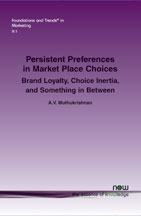Persistent Preferences in Market Place Choices: Brand Loyalty, Choice Inertia, and Something in Between
By A. V. Muthukrishnan, Hong Kong University of Science and Technology, China, mkmuth@ust.hk
Abstract
An important marketing objective by which a firm obtains sustainable competitive advantage is to create and harness customer loyalty for its brands. A high degree of consumer loyalty is probably the greatest asset marketers can possess. While there are several reasons for being loyal to a brand, I believe that in the past two decades undue emphasis has been given to the person–brand relationship and related constructs such as self-brand connections and commitment based on emotional attachment. In this review, I have highlighted other major reasons behind loyalty. I use a milder term — persistent preference — to highlight that a major subset of repeat purchase behavior is not characterized by a high degree of emotional content. Nonetheless, for many forms of challenges by competitors, this subset may show more or less the same consequences that are normally attributed to loyalty with heavy emotional content. I review classic and more recent research on brand loyalty and attitudinal resistance, and research on persistence from a behavioral decision theory perspective. Based on this review, I identify four types of persistent preferences and describe their characteristics.
Persistent Preferences in Market Place Choices: Brand Loyalty, Choice Inertia, and Something in Between
Persistent Preferences in Market Place Choices has as its primary focus the type of brand loyalty that is not deeply rooted in values, emotions, and intense person-brand relationships. While some view that loyalty cannot exist without strong emotional involvement and bonding, the author suggests a milder phenomenon – persistent preference – for the chosen brand and its attributes. Persistent preferences refer to preferring a previously chosen brand to other brands even when a subset of these are superior to the previously chosen brand in terms of attributes, economy, or overall quality. Persistence also refers to a lack of change in beliefs or evaluations toward the chosen brand due to counter-evaluative information supplied by competitors or other sources. An understanding of why and how consumers develop persistent preferences is interesting from both theoretical and managerial perspectives.
Persistent Preferences in Market Place Choices reviews classic research on loyalty, the many definitions of commitment and their relevance for persistent preference, the constituents of preference persistence, research on attitude strength, and behavioral decision theory research relevant for preference persistence. The author concludes by summarizing the types of loyalty and their strengths.
